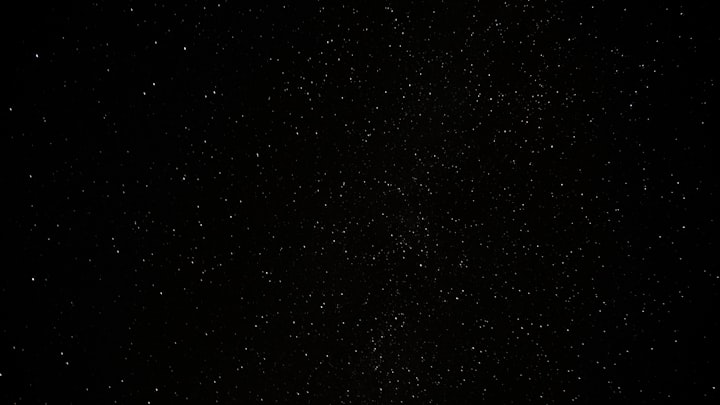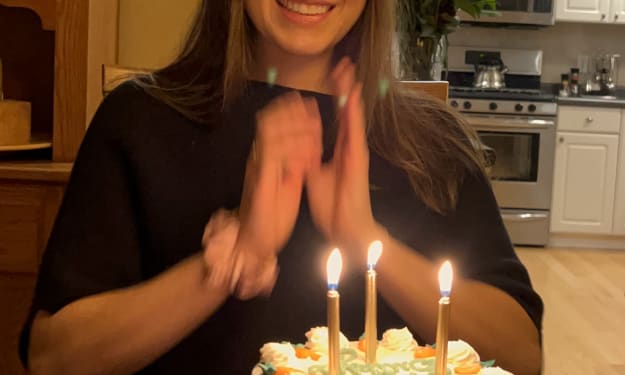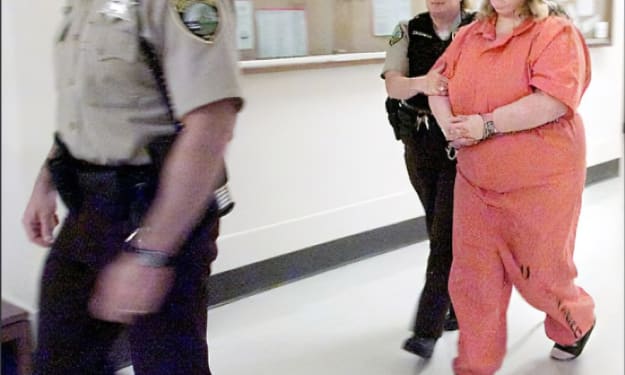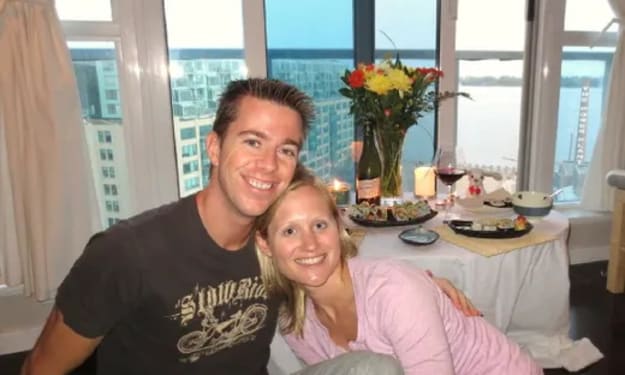An Answer from the Sky
A fictionalized explanation of the murder of Elizabeth Short, also known as The Black Dahlia.

Interview Room 2 is simple and square. The single light in the middle of the ceiling lands at the crown of my head. I have arrived on stage, and they’re waiting for the show.
There are two in my audience. The one on the right interlaces his sausage fingers in his lap, his arms framing the potbelly beneath his white button-up. Waiting, expectant. Brown, he said his name was, and I remember because his eyes are dark like a ferret’s, circular and unrevealing.
The one on the left is triangular, his nose goose-like and long to match his fingers resting on the desk in front of him. Hansen. He raises an eyebrow, gives me a once over. I inhale, aware of how the belt of my tickling wool dress cuts the tumor of fat on my belly. He brings his index and middle finger to his temple. He’s wearied of me already.
Earlier, while alone in my apartment, I had rehearsed this upward of a dozen times. Now, every detail that I catalogued to ensure my credibility seems improbable. That’s the caveat with practice; it’s only useful if you have an audience. When you’re fated for solitude like I am, there’s no one to dispute your claims before you declare them publicly.
Desperate to get it over with, I blurt my opening: “I was out there with her.”
I’m a plain girl—a ranch girl, thick, the color of sawdust, miles removed from a woman like Elizabeth Short. This show light doesn’t frost my temples like a teacake, not like the lights that illuminated her body while it suspended in mid-air, a sacrifice to the stars in that early morning in mid-January. And here I am, trying to repaint the picture in this stale cellar.
Brown remains a statue. Hansen pushes his chair from the table between us, as if stepping back from a cage at a freak show, still he assesses my shoulders, my neg, my chin, my eyes. Is my story plausible?
“You,” Hansen begins, his two pointer fingers skimming the longitude of my person. I feel him poking at my chunk, prodding at my plainness. “You were out with Elizabeth Short?”
Brown’s right eye contracts. He tilts his head, seconding his partner’s doubt.
I inhale tight through my nostrils.
“I was out there,” it comes out like a bark. I hate myself for my vocabulary; how could I have just reduced those sacred vacant lots to such careless anonymity? The more specific each depiction, the more believable the story.
Hansen leans forward, elbows on the table. His fingers now meet into the tip of an arrow; he points to me. “Miss Lundy,” he begins. “You were out at the vacant lot on Norton Avenue, just lying there alone in the weeds?” His eyes twinkle underneath the canopy of his hat.
“Yes,” I answer in a moment of relief. He’s said what I couldn’t articulate myself.
“I work for Olmsted.” Name-dropping is a virtuous way to start. If they wanted to quiz me on the topography of those sprawling virginal acres that would soon be suburbia, I’d know it all, down to each lot’s respective proportions of ragweed.
Hansen seems satisfied with that one.
“And what exactly were you doing,” he begins again, opening his hands, inviting me to reveal more, “out in that vacant lot, all night long, all by yourself?”
“I was looking.”
“Looking for what?”
“I was looking for shapes in the sky when I saw who murdered her.”
Hansen remains steady, poised, but I can see I’ve opened him now. It was like how I had rehearsed it; from memory, I give every meticulous observation, all the finite, clarifying details. And they listen.
“You know who it is, then?” Hansen’s stubbled chin strains forward from his neck.
“Yes, I know who it is.” As he leans back in his chair, he opens the space between us, asking me to open myself to him. I am no longer the timid creature that tiptoed through the lobby in trepidation, clutching at the leather reins of her handbag so she doesn’t fall away. Right now, my body is valuable, a vessel for evidence. I swallow, accepting his ticket into my show. I inhale, prepare to unbutton my story, to expose myself for the first time.
I lay in the weeds without a blanket, the chaotic vegetation and sediment lumps of Leimert Park poking and prodding at my every crevasse. It was, at this point, an almost nightly ritual to subject my back to such prolonged torture. I had hoped that LA would recondition me, teach me how to be with others, but the city was claustrophobic, and those vacant lots were a delightful taste of familiar solitude.
I don’t belong here, really. The story of the dainty ice cream cone who leaves home for Los Angeles in search of vanity is so much more delightfully American than I—thick, abrupt, a mirror of north central Montana. But the night sky is universal, reliable, omniscient. Out in that open terrain, before Leimert poured it with concrete and profits, I could honor my favorite pastime: searching the stars for evidence of the unexplainable.
I was thirteen when I first became obsessed with the possibility of life beyond this earth.
Dad and I were out in the dark. My canvas jacket was thick against the chinook winds that bullied me through the coulees. We tried to keep the cows close this time of year, when Dad and I would have to take a pick-axe to the reservoirs and crush the ice to a soupy slush that the cows could slurp.
The carcass I found was far off, alone, a four-year-old bull. It was laying on its side, typical for this time of morning. But the slice across its chest was surgical, straight from the rear flank to the navel. It was too precise to be animalistic. And the abdomen, satisfied just twenty hours prior with alfalfa, had been hollowed of its rectum with what I could only imagine were clean plyers, calculated and deliberate.
The balls were cut off. I’d seen plenty of castration, but frozen in the virginal snow, I saw that this one was sterile, unnaturally clean, as if waiting for inspection. The absence of blood made the scene almost calm, like this were a mannequin display meant for observation. There were no tracks around it, anomalous and anonymous.
But nothing was as unnatural, as haunting, as magnetically grotesque as the position of its head: the neck twisted, turned straight around to face me, the onlooker. His eyes were lazy, dazed, like an early morning smile, and not an ounce of blood to distract from it.
The universe had specifically requested that I come across that cow like that, in the early morning of an otherwise nameless day on an isolated ranch. There was no earthly evidence for such a thing, and I became instinctually, terrestrially, and perpetually obsessed.
That was the only part of my story that I amended. I couldn’t tell Hansen and Brown that I stayed out all night to look for alien lights in the sky. Such details would be too nuanced, too intimate, too wrapped up in my own pride.
So instead, I simplified. In January, the best time to look at constellations is between the hours of one and five o’clock in the morning, when the rest of Los Angeles is sleeping and light pollution is limited. It was true that I had the constellations memorized at this point, like a familiar book that you read over and over again. I read the sky from West to East; I could always find Saturn, then trace the spread of Hydra, the vast hammock which holds the remaining figures of the galaxy.
I was tracing the little jagged mountains that are Cassiopeia in the early morning of January 15 when I heard her coming north, the scurry of dainty feet tapping rhythmic, quick against the concrete.
I sat up, still concealed in the weeds, and looked south.
The woman glowed, unmissable. Her skin was porcelain, contrasting against the dark of the sterile space, like she was on a stage. Her hair blended with the night, fluffed to frame the delicate heart of her face, her head served on the tray of her dainty shoulders. A specimen, she was lean, diaphanous, like a moving work of art.
She was running in my direction: north. Her arms spread, as if opening herself, flinging her vulnerabilities into the air in a demonstration of courage that seemed to me untouchable. She fluttered, a delicate but defiant bird, fleeing from the south. She stumbled forward, the wavelengths of her sobs pulling me to her like a magnet.
Brown’s eyes narrow, watching my monologue show, just as I had watched Elizabeth. Hansen holds his hand up for me to stop. He thrusts back the leather binding on his notepad, leans forward onto the table, his pen now at the ready.
He asks me to repeat a few things about her appearance as he scribbles. Out of my own body now, I gush in narration, adding every detail I can remember: her mannequin proportions, the contracting of her angular waist as she caught her breath, the spread of her thighs as she fell, straddling the concrete, her cotton dress framing her like a figurine in the middle of Norton Avenue.
“And she was heading north on Norton?” he confirms, his beak still buried in his notebook.
“Yes.”
Hansen writes it all down. I’ve got him now. Or, he’s got me. The legitimacy of my entire existence spills from his ink, and I don’t want him to miss a thing.
He stops, his thumb taking pulse on the neck of his pen. Eager, but not needy.
“Please,” he says. His eyes narrow at me, intrigued, even patient. “Continue,” he prompts.
Elizabeth gasped as she clutched at her heaving chest, screeching and tight. Asthmatic. Even her desperate wheezing was beautiful, commanding of attention. I watched, enraptured, as she chased her breath, opening her arms and tilting her head as she imbibed the crisp air through the clogged straw that was her throat.
Her breathing slowed, and in one full exhale, she released her forehead to the concrete, surrendering herself as a specimen in the middle of the road in this sterile wasteland of assaulted acreage. She was passed out, shut to the world in perceived safety as I looked on, paralyzed in awe.
Head to the pavement, resting and spent, she didn’t at first see the blue lights.
There were ten of them total. They were fleeting, subtle, but the distinct pattern of their blinking is still ingrained in my conscience, and with my hands I animate it for my audience. To the west first, shooting across, then way to the east as they hovered above Elizabeth, skipping rocks across the river that was her body. Back and forth three more times. One, two, three four, like a dance synchronized with the plane of her wingspan, her head bowed to its entrance. Five, six, seven, eight.
This thing that was out of this world, millions of miles or merely hundreds of feet away, blinked once, twice. It was imploring me to see it.
The final light landed at the peak of the crown of her head. Like rhythmic fingers, the saucer, steel and supreme, snapped above her, blinking its spotlight as if it were clapping, impressed with her performance. This was her moment, her manifested stage, and they wanted to see her up close.
They lifted her limber body by the torso, flipping her over to examine her face. Her limbs cascaded to the ground, opening to her heart. They hugged her closer, claiming her for their own, ready to prod, to mutilate, to mark the territory of her body, holding her in their blinding glow above the earth.
They suspended her like that for as long as they needed, satisfying themselves with a decadent dinner of flesh, while I suspended disbelief, enraptured, until they decided they were satiated.
In one fell swoop, the saucer, which had moments before whispered to me in its secret, blinking language, silenced its light, shifted to its right, spat its final film strip click, and plopped the pieces of my long-awaited proof in front of me.
Elizabeth, lasered in half at the abdomen, grotesque, but clean. The commanders of the blue light had carved the corners of her mouth into a lipstick smile, as if to capture her beauty by way of her blood and pull me deeper into skyward infatuation, all at once. Her arms framed her head like a curtain. Her eyes rested open, gazing, speaking to me, just like the bull all those years ago, and I understood that this was a proposition, an agreement between them and me. They were leaving a message, a sequel to the mannequin cow that they sent me that one night in February. But this time, they’d done it especially for me. Her body, drained and limp, a perfect prototype for perpetual observation, had become proof of their existence.
I open my eyes. I had been holding it in, and now, here I was, splayed open for these two, awaiting their inspection.
They steal glances at each other. Brown chuckles, a series of suppressed contractions bubbling to his surface. After the perpetual rotation of dubious men who claim to have sawed Elizabeth in half, my story is nothing but comic relief.
Hansen leans back in his chair. He bends his right leg, resting the ankle on the indent of his left knee. He crosses his arms, the opposite of applause. He looks me up and down once more, taking stock of my sharp nose, my crater terrain of pores, my boxy frame. I am powerless here under these lights, a showcase of the unbelievable. A plain girl attempting to convince an audience, only to make a fool of herself.
“Don’t you think,” he smirks, waiting a beat before delivering his verdict of disbelief: “that you are probably just imagining things?”
***
Thank you for reading.
If you like it, please share, comment, subscribe for more, or do all three.
Leave me a tip or make a pledge, which I put toward book purchases, literary magazine subscriptions, and submissions fees.
About the Creator
Catherine Dorian
Writer and teacher. Sometimes, I write about teaching.
✨
For me, writing is compulsive, but it never feels self-destructive; it’s the safest medium by which I can confront what scares me.
I've been told my Instagram needs a makeover.







Comments (6)
Great
Superb work! Keep it up—congratulations!
Nice read!
At some point (actually closer to the end but before it became too obvious) I started doubting the credibility of the witness. Took me actually 2 days to finish reading your story. First time got distracted by searching info about Black Dahlia and her death. And the next day bang, it's a top story:-D
Excellent!
OMG, this is FANTASTIC! Existential, and there's really no proof it didn't happens this way, since the murder was never solved. I LOVE the decidedly alternate take to the usual suspects. Bravo, Catherine, a story that reaffirms why I love your work so much!